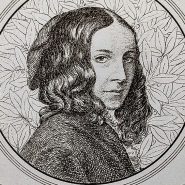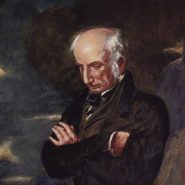By Percy Bysshe Shelley (1820)
Hail to thee, blithe Spirit!
Bird thou never wert —
That from Heaven, or near it,
Pourest thy full heart
In profuse strains of unpremeditated art.
Higher still and higher
From the earth thou springest
Like a cloud of fire;
The blue deep thou wingest,
And singing still dost soar, and soaring ever singest…
We look before and after,
And pine for what is not —
Our sincerest laughter
With some pain is fraught;
Our sweetest songs are those that tell of saddest thought.
Teach me half the gladness
That thy brain must know;
Such harmonious madness
From my lips would flow,
The world should listen then — as I am listening now.
Originally published in Prometheus Unbound, with Other Poems (1820) by Percy Bysshe Shelley. Public domain.
Analysis
“To a Skylark” stages an ascent the body cannot follow. The bird becomes pure song — “blithe Spirit” — and so a lesson in art freed from earthly lack. Similes strain to catch it — cloud of fire, star of Heaven — but the point is not capture, it is longing raised to praise. Shelley’s stanzaic music makes the desire audible, a ladder built from sound.
Human joy is mixed, the poem admits; our laughter has pain in it. The skylark’s absolute gladness is therefore enviable and alien, a vision that reveals the cost of consciousness. Yet the closing prayer is practical: to learn “half the gladness” is to make art that consoles without lying. Shelley’s lyric becomes a school of joy tempered by truth.

